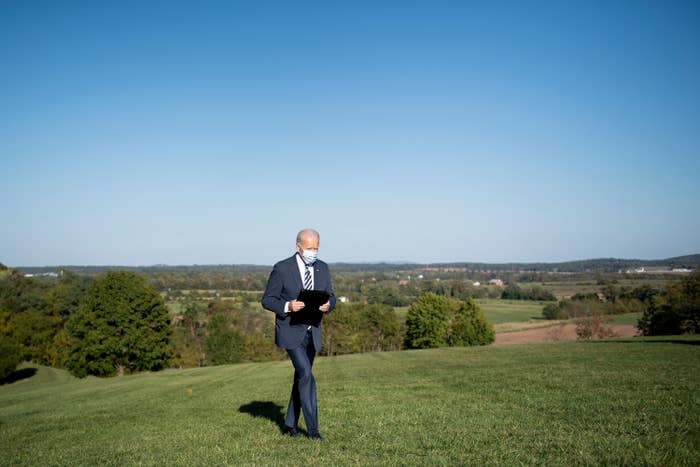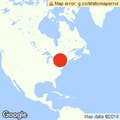
GETTYSBURG, Pennsylvania — On the first day, President Donald Trump tested positive for the novel coronavirus.
On the second, America woke up to the news, suddenly full-body submerged in a bewildering mix of chaos and confusion and a succession of more positive tests (his wife, his campaign manager). On the third day and the fourth, his doctors obfuscated and misled the public, flooding Twitter with hour-by-hour updates on supplemental oxygen levels, on lung scans, on steroids and words like dexamethasone and Regeneron, until the president, still contagious, checked himself out of Walter Reed National Military Medical Center.
On the fifth day, a Tuesday, which is today, the deluge kept coming: Trump reportedly wanted to return to the Oval Office, he walked away from coronavirus relief talks on the Hill, the market tanked, more White House staffers tested positive, Facebook banned QAnon, and the chair of the Joint Chiefs of Staff and other senior Pentagon officials announced they would be quarantining after the vice commandant of the Coast Guard tested positive for the coronavirus.
And then there was Joe Biden.
Not long after the S&P 500 plummeted to a session low, the man asking America to return to normal touched down near Gettysburg, Pennsylvania, climbed into the back of a black SUV, and set off for a historic Civil War battlefield, clutching a slender black binder.
The campaign plans inside were on Tuesday dedicated to a somber 27-minute speech — an appeal for “the spirit of bipartisanship” and the tradition of “soul and honor” in the face of division — set at a hotel overlooking the storied fields of the Battle of Gettysburg.
“As I look across America today, I'm concerned,” Biden said. “The country is in a dangerous place.”
The noise in Washington, still too much to track, tweets whizzing by, did not reach Gettysburg on Tuesday, giving Biden’s speech the feel of a desperate call during a desperate and baffling time — an alternate vision, delivered from his own alternate version of America.
It was personal too. Biden, the 77-year-old former vice president, told supporters during an online fundraiser earlier on Tuesday that he had “worked on this speech very, very, very hard.” He seemed nervous that people wouldn't get the full picture of what he had in mind — “I don't know how it’s gonna sound to you,” he said — but he trusted that they would. “You’ll see it and know it — I mean every word of it,” Biden said. Onstage, he quoted Abraham Lincoln and Frederick Douglass. He recalled a visit to the Civil War battlefield here by Lyndon B. Johnson, another vice president: “Our nation found its soul and honor in these fields of Gettysburg,” Biden said, quoting Johnson in 1963. “It must not lose that soul in dishonor on the fields of hate.”
Biden spoke not far from Gettysburg National Military Park, at the Lodges at Gettysburg, on a stage dressed in black with a placard that read "BATTLE for the SOUL of the NATION.” It was a quiet event, attended by a small group of supporters and reporters. He made a long walk across the property to the stage in silence before a woman in the socially distanced audience let out a solitary cheer.
“Why can't we yell?” she said to no one in particular, prompting some hesitant cheers from the other supporters around her. “That's what we're here for, right? To yell!” the woman said.
They weren’t visible from the podium, but outside the hotel a group of about 40 Trump supporters lined the perimeter of the property, dressed in a small sea of red, white, blue, and pink, and wielding "Make America Great Again" signs and American flags.
Four weeks before Election Day, Biden’s speech was in large part a return to the themes with which he began his campaign: his horror at the Nazis and white nationalists who descended on Charlottesville, Virginia, in 2017, his view of the race as a “battle for the soul of the nation,” his promise to return to a tradition of Great Presidents.
“We need to revive the spirit of bipartisanship in this country, the spirit of being able to work with one another,” Biden said on Tuesday in a speech that balanced his wistfulness for old-school civility with an acknowledgment of the pain and injustice, and particularly racial injustice, of the past and present.
“I think about what it takes for a Black person to love America. That is a deep love for this country that has for far too long never been recognized,” Biden said. “What we need in America is leadership that seeks to deescalate tensions, to open lines of communication, to bring us together, to heal, to hope. As president, that's precisely what I will do."
He’s been aware for two years now, he said, that people might think of that view as “naive” — “I'm told, ‘Maybe that that's the way things used to work, Joe, but they can't work that way anymore’” — but he still disagreed.
“I'm here to tell you they can and they must if we're going to get anything done,” he said. “I'm running as a proud Democrat — but I will govern as an American president. I'll work with Democrats and Republicans. I'll work as hard for those who don't support me as those who do. That's the job of a president — the duty to care for everyone."
In the speech, Biden made no direct mention of Trump, the president’s COVID-19 diagnosis, or the news of the day. His one remark about the pandemic — “Let's end the politics and follow the science” — was itself a call for de-escalation and unity. “Wearing a mask is not a political statement. It’s a scientific recommendation,” he said.
Later in the evening, he briefly spoke with reporters about the prospect of another debate with Trump, not long after news broke that yet another senior White House official, Stephen Miller, had tested positive for COVID-19.
“Well, uh, I think if he still has COVID, we shouldn’t have a debate,” Joe Biden told reporters, before adding that his decision would be “guided” by the Cleveland Clinic, the Ohio hospital serving as the health adviser to the Commission on Presidential Debates, and “what the docs say is the right thing to do.”
During his fundraiser on Tuesday, a Zoom call with Black supporters and business leaders, Biden told supporters he viewed the setting with deep emotion and significance.
“We have to unite this nation, and I've decided to do it from Gettysburg,” he said, citing Frederick Douglass’s response to Lincoln’s second inaugural address. “He said it is a 'sacred try.' We have to have the sacred try to get this right.”
Exactly one week ago, Biden appeared at the first presidential debate in Cleveland. Onstage that night, he cut through the disorder by yelling back at Trump, calling him a “clown,” a “fool,” and at one point shouting, “Will you shut up, man?”
Biden later said he regretted his choice of the word “clown.”
“Folks, duty and history call presidents to provide for the common good,” he said on Tuesday. “And I will. It won't be easy. It won't be easy. Our divisions today are long-standing. Economic and racial inequities have shaped us for generations. But I give you my word. I give you my word."
Two hours after his speech, Biden stuck around the hotel to film some promotional material for his campaign. Around 6:15 p.m., when his motorcade finally pulled out of the driveway and headed for the airport, the Trump supporters were still outside, waving and smiling.

